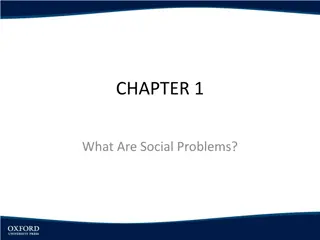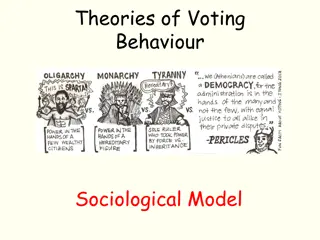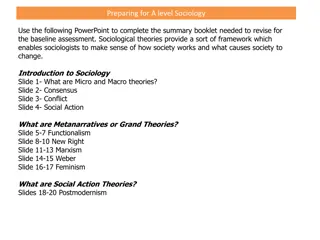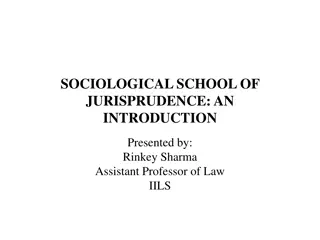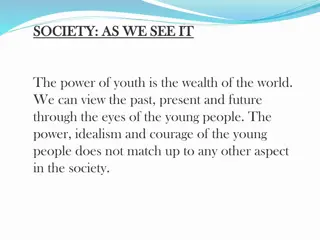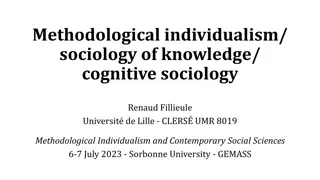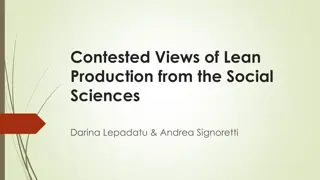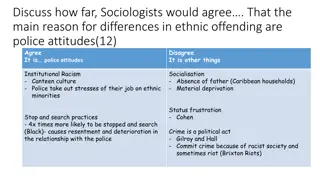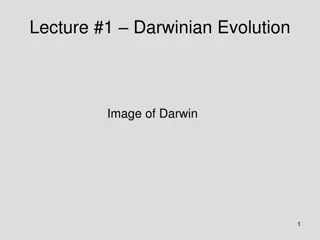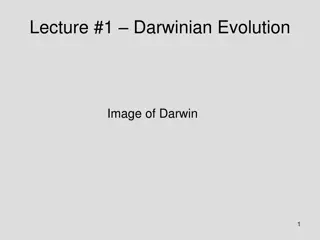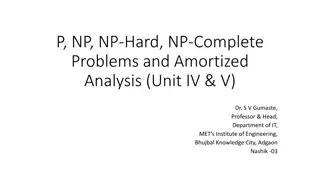Evolution of Sociological Perspectives on Social Problems
The study of social problems has evolved dramatically since the 1970s, shifting from an objectivist approach to a more subjective and constructionist perspective. This shift acknowledges that what is considered a social problem is a matter of definition, and focuses on the social processes involved in labeling certain conditions as problems. Rather than evaluating conditions, sociologists now examine the activities of groups expressing grievances and making claims about these conditions. This new approach emphasizes the subjective nature of defining social problems and the importance of understanding claims-making activity.
Download Presentation

Please find below an Image/Link to download the presentation.
The content on the website is provided AS IS for your information and personal use only. It may not be sold, licensed, or shared on other websites without obtaining consent from the author.If you encounter any issues during the download, it is possible that the publisher has removed the file from their server.
You are allowed to download the files provided on this website for personal or commercial use, subject to the condition that they are used lawfully. All files are the property of their respective owners.
The content on the website is provided AS IS for your information and personal use only. It may not be sold, licensed, or shared on other websites without obtaining consent from the author.
E N D
Presentation Transcript
Social problems The study of social problems has undergone a major and exciting shift in direction since the 1970s. The field was once dominated by approaches that treated social problems as objective and observable aspects of reality. Social problems were defined as conditions that are undesirable, unjust, dangerous, offensive or in some way threatening to the smooth functioning of society. The primary concern for those adopting an objectivist or realist approach was to identify such conditions and to get at the underlying forces contributing to the problem, often with a view to recommending ameliorative action. Since the 1970s an alternative perspective has emerged. 'Social constructionism' (as it is generally called) starts from the premise that what gets viewed as a social problem is a matter of definition. Many of the conditions and behaviours that are now regarded as social problems were not always considered problematic. Parents once had the right to discipline their children as they saw fit. We now regard certain forms of discipline as child abuse. Date rape, the environmental crisis, drunk driving, homelessness and AIDS have all become an integral part of public consciousness and debate, yet until recently were unnamed or unnoticed.
Other conditions and behaviours such as homosexuality and pre-marital or extramarital sex might have been considered social problems in the past but are now less likely to be viewed in these terms. These examples show that our experiences and interpretations of conditions change and that what constitutes a social problem is essentially a subjective judgement. If this is the case, how can social problems be studied? Rather than focusing on objective conditions, constructionists direct attention to the social process by which conditions come to be seen as problems. In Constructing Social Problems, a book that has been described as a 'watershed in the development of the contemporary sociology of social problems (Miller and Holstein 1989:2), Spector and Kitsuse (1977) encouraged sociologists to abandon the notion of social problems as a Kind of condition and suggested in its place a conception of social problems as an activity. They defined social problems as the activities of groups expressing grievances and making claims about putative conditions.
The task for sociologists of social problems they suggested was not to evaluate or assess such claims but to account for claims-making activity and its results. Indeed, to guard against the tendency to slip back into an analysis of conditions, Spector and Kitsuse insisted that all assumptions about the objective conditions, including? Assumption about their very existence be suspended To Extent that sociologists address the condition themselves, they become participants in rather than analysts of the process they should be studying this orientation to the study of social problem and especially the concept of claims making have become the heart of the constructionist approach. In contrast to objectivists, then who look social conditions, their causes and solutions, constructionists are interested in the about conditions, the ways in which meanings concerning undesirable Are produced and the responses that these activities generate.
The significance of this new thrust in the study of social problems is not only that it has given sociologists and other social scientists a way to deal with the subjective nature of social problems, but also that in so doing it has provided a distinctive subject matter for the field. The traditional objectivist approaches produced analyses of social conditions bound together by nothing more than the analyst's assessment of these conditions as undesirable. The conditions themselves had little in common., so that an understanding of any one condition contributed little to an understanding of others. In conceptualizing the field in terms of claims-making activity, constructionism provides a separate focus, a specific set of questions to guide research, and the framework for building a theory of social problems as distinct from theories about undesirable conditions (Best 1989: xvii; Schneider 1985:210). Since its emergence, the constructionist perspective has revitalized the study of social problems.
It has generated a large body of empirical work examining claims-making efforts around issues ranging from prostitution, missing children, smoking, coffee drinking, sexual harassment, and toxic work environments to homosexuality, AIDS, teenage drinking, rock music, the marketing of infant food formulas in the Third World, and child, spousal and elderly abuse. The literature covers not only contemporary issues but also historical efforts such as the construction of margarine as a social problem in the nineteenth century and the early eugenics campaigns against impoverished women. Increasingly there are studies that look at the social problems process in cross-cultural contexts. A prominent theme since the early 1980s is the increasing 'medicalization' of social problems.
Medicalization refers to the tendency to view undesirable conditions and behaviours as medical problems and/or to seek medical solutions or controls (Conrad and Schneider 1980). Constructionists have examined the medicalization of such conditions as alcoholism, drug addiction, cult membership, academic underachievement, crime control, compulsive gambling, sudden infant death, transsexualism and physician impairment. (Most of these studies have been published in the journal Social Problems; see also the JAI research annual Perspectives on Social Problems; Best 1989; Schneider and Kitsuse 1984 for collections; for a selective review, see Schneider 1985.) The ever-growing number of case studies is providing the field with a strong foundation for theorizing about the unique role played by public agencies, government, social movements, the media, 'experts' including social scientists, and other participants in the social problems process, the rhetorical strategies and vernacular resources (Ibarra and Kitsuse 1993) that claims makers use, and the consequences of claims making in terms of who gains ownership over social problems and what policies and institutionalized procedures they establish to deal with them.
The constructionist approach to social problems has also generated lively theoretical debates about the assumptions that the approach makes, the way it is applied, and the future directions that it might take. Much of the debate has centred around the extent to which sociologists have remained true to the original formulation of the approach with its requirement that any reference whatever to objective conditions be avoided. Some sociologists have made the effort to maintain complete impartiality with respect to the validity of claims and the nature of the conditions about which claims are made, restricting their analyses solely to the definitional activities and interpretations of claims makers. Others do not see the need for such a strict interpretation and allow themselves to challenge the truth value of claims they 'know' to be false (Gusfield 1985; Rafter 1992).
There are disagreements about whether the radically subjectivist position that Spector and Kitsuse (1977) called for is desirable or even possible (Best 1989; Troyer 1992; Woolgar and Pawluch 1985). From those working outside a constructionist perspective there are still questions about the real social problems that have an existence independent from how they might be seen and the moral obligation social scientists have to speak out and even to act against conditions they consider to be unjust (Eitzen 1984). Despite these debates, what remains clear is that the constructionist approach has been and will probably continue to be a productive source of social problems theorizing and research.


